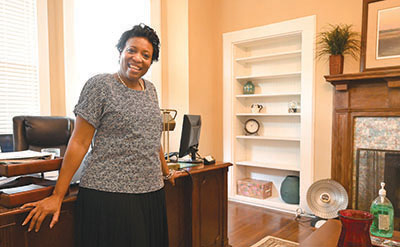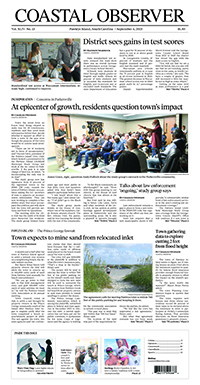Georgetown County
100 days – Questions for the new administrator

Angela Christian made a promise to herself and her husband. For her first three months as Georgetown County administrator, she would listen.
Now, after 100 days, Christian is ready to talk.
Q: The first 100 days. Does it seem that long?
A: It has been a whirlwind. It has been 100 days of adventure.
Q: What was your initial impression of Georgetown County when you applied for the job?
A: It was coastal community. Diverse. Culturally rich. Historical. Challenges between communities, between sections of town. Financially, it had some things I was probably going to have to take a look at when I got here.
What has surprised me most?
I have found the community friendly and welcoming and rich. Rich in that they have been so, so happy to embrace me and my family. Folks have called me on the phone. I don’t know them from Adam, but they wanted to call me that first week just to welcome me to Georgetown. Everywhere I go, from the dry cleaners to the grocery store to picking up take-out food, and I sign my name and they’re like ‘Your name looks really familiar. Oh, you’re in the newspaper!’
That makes you feel very much a part of the community. I’m a community person and I want to connect to the community.
Q: How did the pandemic change your transition plans?
A: It turned them upside down. Before I started, before the pandemic, I had mapped out to council my hundred-day plan. These were the folks I was going to meet. I was going to meet every single employee. I was going to meet community leaders, groups of folks from Rotary to faith community. I had this very extensive plan.
Well, well, well.
A lot of folks are working from home and I’m meeting folks in small groups, which of course takes you a long time. It has been very slow going. Often times when folks see me, I’m on the phone, because with some folks that’s the only way I’ve met them. That has certainly been the challenge.
It’s just going to take some time. I’ve got lots of invitations for when we come out of this.
Q: Technology still can’t replace personal contact?
A: It really doesn’t. Especially since I’m new to the community. I try to be very intentional and very deliberate. I’m meeting new people every day.
Q: You arrived in the middle of the budget cycle. What was your goal, and did it change?
A: I started March 30. April and May, I had to do the budget. There are some things I see and things I want to get done, but we don’t have time to do them. My goal was to get it done. We’re not going to do anything radical at this point in time because you just don’t have time to do the analysis.
Before we get into the next budget cycle, there are some things we’re going to come back to several times before the budget starts with some things that we’re taking a look at. I saw them when I was doing the budget and we’re going to have to circle back to look at some of those challenges.
Going into the process, certainly there were capital equipment requests that we weren’t able to do. I cut funding for some stuff, legitimate, good things, but I needed to meet my deadline. There are consequences to doing those kind of things. Between July 1 and Dec. 31, we’re going to work on our plan to address some of those issues.
The other thing is, I firmly believe there is going to be a second wave. The pandemic is going to extend longer than we think. What are going to be the long-term consequences? I’m very conservative in looking at our estimates. It’s so much easier to bring in more than to bring in less.
Q: You mentioned spending cuts. Operating costs were down 10.3 percent, but you had increased costs for health care and pensions. Where did you make those cuts?
A: They were in deferred maintenance. We didn’t do great projects that the departments had proposed. We decided not to fill some positions. They’re not going away. We’ll circle back to doing those. If it wasn’t absolutely necessary, we didn’t fund it. We were trying to stay true to the heart of providing core services to the community.
Q: Are these things the public would see or are they mostly internal?
A: It is mainly internal. There are a couple of fee increases that we were going to do. It was important to do that this time. We really didn’t have time to talk about doing much else.
Other things we’re talking about doing between now and the six-month mark is really to address those issues. One of the things you have to think about is a lot of the capital projects were already done. Those things are already built. Let’s make sure we’ve got the operating money.
I would love to be wrong. I’d love to say, the pandemic’s not going to be that bad and revenues are going to be through the roof. I’m not feeling that right now.
What helped us in the spring when we were doing the budget was that taxes and all the major revenue were already in. What was impacted were the tourism kinds of stuff, short-term rentals. It will be very different in the fall. Taxes are due late fall. The economy’s in the tank. Are people going to pay those taxes?
Q: So next year could be tougher on the budget?
A: Yes. We are trying to be very, very careful. I don’t want to have to lay people off. I want to keep the folks working. To keep the people as safe as I possibly can. To invest in those kinds of things. We are trying to avoid having serious, serious employee issues.
We are seeing more impact from employees that have caught it in other aspects of their life. It’s affecting what we do every day. We’re going to try to be as responsive as we can be to the citizens, to our employees to try to protect them at work. We’ve added glass, we’ve provided masks, we do appointments. We’re doing all those things we can do to try to keep our folks safe.
Q: Pandemic aside, what is the path to a sustainable budget for Georgetown County?
A: Part of my goal is that we will continue to try to reduce our use of fund balance in our major operating budgets over the next five years. It didn’t just get that way so you can’t stop it right away. We are taking a hard look at our financial picture to see where we need to make a change. That requires fundamental change in looking at how we are spending our money. I recently told a department head if we want to have raises and take care of our folks, pay pensions and health insurance, we’ve got to make some fundamental changes in our organization.
Some of these expenditures we have, we need to take a second look. Is this something we need to continue doing? Is this the right way that we need to be spending our money and can we continue doing it? Is it sustainable?
We have got to take a hard look at efficiencies. Are we doing it because we’ve always done it that way? And that’s tough.
Q: Has anyone told you that?
A: Oh, yeah. They say, ‘I know I’m not supposed to say it, but we’ve always done it that way.’ But is it the right way? Is it something that we can continue to do? Are we good at doing it?
It’s a culture shift. It’s not just about the money. That’s what I said to you about the fund balance it’s not going to happen all at once. That happens over time.
Q: Is is possible to make change comfortable?
A: I think that’s the exception rather than the rule. But we are experiencing the ultimate disrupter. Will we ever go back to hugging people? Not anytime soon.
There’s a great quote, ‘With every crisis, there is an opportunity.’ I am trying to take advantage of an opportunity to take a second look at some of the things that we’re doing. If we didn’t do it well, did anybody miss it? Hmm.
Q: Before your official start, you dialed into the capital projects sales tax committee meetings. What was you take-away from those sessions?
A: Oh, my. It exposed to me that there are so many needs that the county has spread all across the county. For some, they were fundamentals: water and sewer. Others were recreation and things that folks wanted to see to enhance the community. The requests were so vast and far exceeded any money we would ever think to have as part of this process.
We’ve got to have multiple ways that we fund the needs of this county. It’s not just capital projects. Maybe it’s capital projects and a sales tax. We need both. We can’t tax people enough to do all those things that folks were talking about. It’s not possible.
How do you make a dent in it? What’s the vision of our community? What do we want to be when we grow up?
Q: Did you see any pattern from that process?
A: It was a bit overwhelming. It told me that we need to have a financial structure to be able to make a dent in how we address capital needs. I saw the need for a long-term plan.
Some of the projects that folks proposed, there was no way. It was not going to be physically possible to do some of those projects in the time period. We’ve got to hone the process and give more parameters. It takes two years just to get the permits to do some of this stuff. The volume of projects was just phenomenal. I can’t hire enough people to do projects on that level.
We need some boundaries of what to look at. Before it was disbanded, it was like $500 million. We’ve got to pump the brakes on this.
Q: Through that process and being on the job, what is your sense of Georgetown County’s needs?
A: I come at it from a little different perspective. We need some housing. We need to address flooding. We need to address roads. Those are things that I saw first.
I also tell folks that we need to bridge the bridge. It is amazing to me all the different territories, that’s what I call them. It doesn’t matter where you live, you’re in Georgetown County. The things that we have to look at collectively, with all our territories, is that we live in Georgetown County. We have to make Georgetown County work as a whole. And it may not be your turn today.
The expenses of providing all of these things that we have, it is not going down. We need some friends to help us pay for it. I can’t tax you enough to maintain – not add to – all that we have today. As we go to a sales tax and add to it, guess what? The maintenance costs rise.
We have to find a way to get all this new fun stuff everybody wants, I have also got to have enough money to pay the electricity on that new building and pay the people that operate it. It’s like when you get a new car. That’s the cool part, but occasionally it’s got to have an oil change. It’s got to have a little maintenance done on it.
We have a real issue with flooding. There are serious things that we have to do to address that in our community. There are real people that are injured, their houses are not OK. They don’t have anywhere to live. They can’t even find anywhere to go temporarily.
I have folks who call me and say ‘I would like to open a new business, but I don’t know where the people can live that would move here.’ Teachers have nowhere to live, but we want them to teach and educate our children. I want them to be able to live, work and play in Georgetown County. But they’ve got to live in Horry County because they’ve got nowhere to live here.
That’s an ongoing challenge that we have here.
Q: Should the county have a role in that or will the market take care of it?
A: Those are some of conversations I’ve started to have as we talked about economic development. With the pandemic, I’ve had the opportunity to have some very detailed, in-depth conversations with business owners, with potential interests. I call this the time of kicking the tires. They have time to give me their perspective on Georgetown County.
Q: How do you organize your time? What’s your day like?
A: Oh, my goodness. It is meetings, meetings, meetings, from probably 9 a.m. to 6 every day but Friday. Friday’s kind of my catch-up day.
Sometimes, people come to me and talk about an area. I have no idea where it is. I have to get in my car and drive. I’ve got to have a visual. I’ve got to see what it’s like.
It’s challenging, but I’ve listened and I’ve learned a lot. I’ve had the opportunity to let folks tell me what their visions are for the community. What they like, what they don’t like, what they wish I would change. That’s been pretty fascinating.
Q: You didn’t have much to say in your first few council meetings.
A: I’m still listening. I promised myself and I promised my husband that I was going to listen for the first 90 days or so. I recognize that there has to be a cultural shift in doing things differently and remaking our organization. It can’t happen all at once.
Every organization has a personality and I needed to get the feel, get to know the councilors, what they deem most important, so as we rebuild the organization that’s incorporated as we move forward.
Q: So that wasn’t the real you?
A: I’ve had to be very quiet. It’s tough to listen. Not that people don’t have great things to say, but I’m a doer by nature.
Q: Where are we going to be in three years, when your contract is up for renewal?
A: I’ve created a list that probably has a hundred projects on it. I’m going to make some headway on that list. You can’t do it all. Some of those things are going to morph into something else. We’re going to make some significant dents in taking a hard look at our organization and what we’re trying to do.
Certainly, we will revisit the capital projects sales tax and what that looks like. I suspect that we will also look at visioning and planning and what the priorities will be. That takes time and energy and expertise. We’ll be moving.
I’m trying to assign projects as fast as I can. It just takes time.
I’ve spent these three months listening and learning. That’s what came out of that. Some of that is preparation for where we go next. There’s a lot of interest in that sales tax. Well, what does that sales tax really need to look like? What are those priorities? Whatever we’ve got on there, you pretty much have to be able to do it in six years. I can’t really build a bridge in six years.
Q: If you could just snap your fingers and do one project, what would it be?
A: I’ll give you an example. All of us who are dealing with the pandemic and what that means, were we ready technology-wise for more of us to work from home as needed? We’ve got work to do to be able to do those things. That pointed out a need we have to up our investment in technology to do some things we haven’t thought about.
Q: Anything else?
A: I thought about some of the things that we’ve done that I’d almost forgotten about. The first day I came I asked about the census. I know what happens to a community long-term when you don’t get that done. There are real ramifications in your community with lack of funding if folks don’t get counted.
Our numbers were terrible. We’ve got to continue to be very aggressive to get that done. There are 10-year implications to our community if we can’t get our numbers up.
One of the things that I’m real proud of that we did at the beginning, we did the Georgetown Strong video. I’d seen something similar in another South Carolina community. The staff just took it on and went with it. That was very, very cool. The community responded to that very, very positively. There are more opportunities that we have to do things like that.




